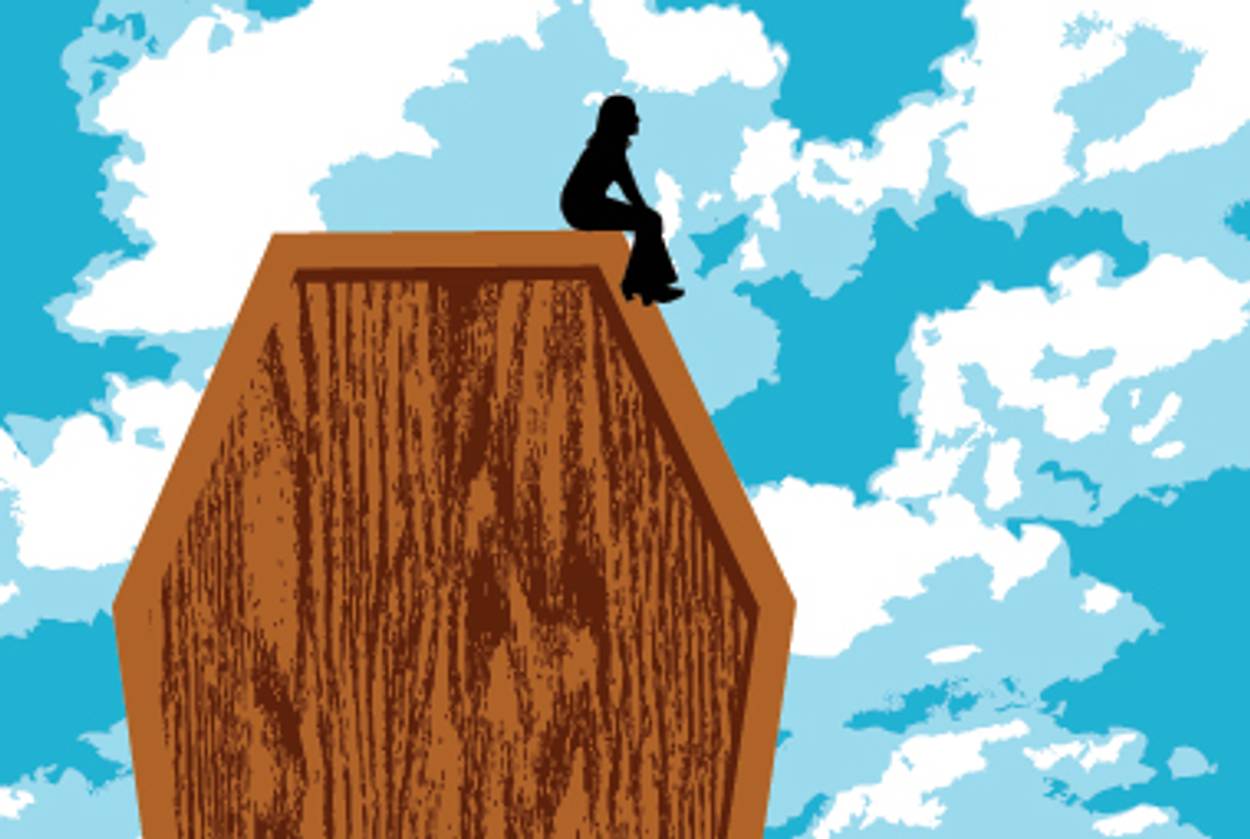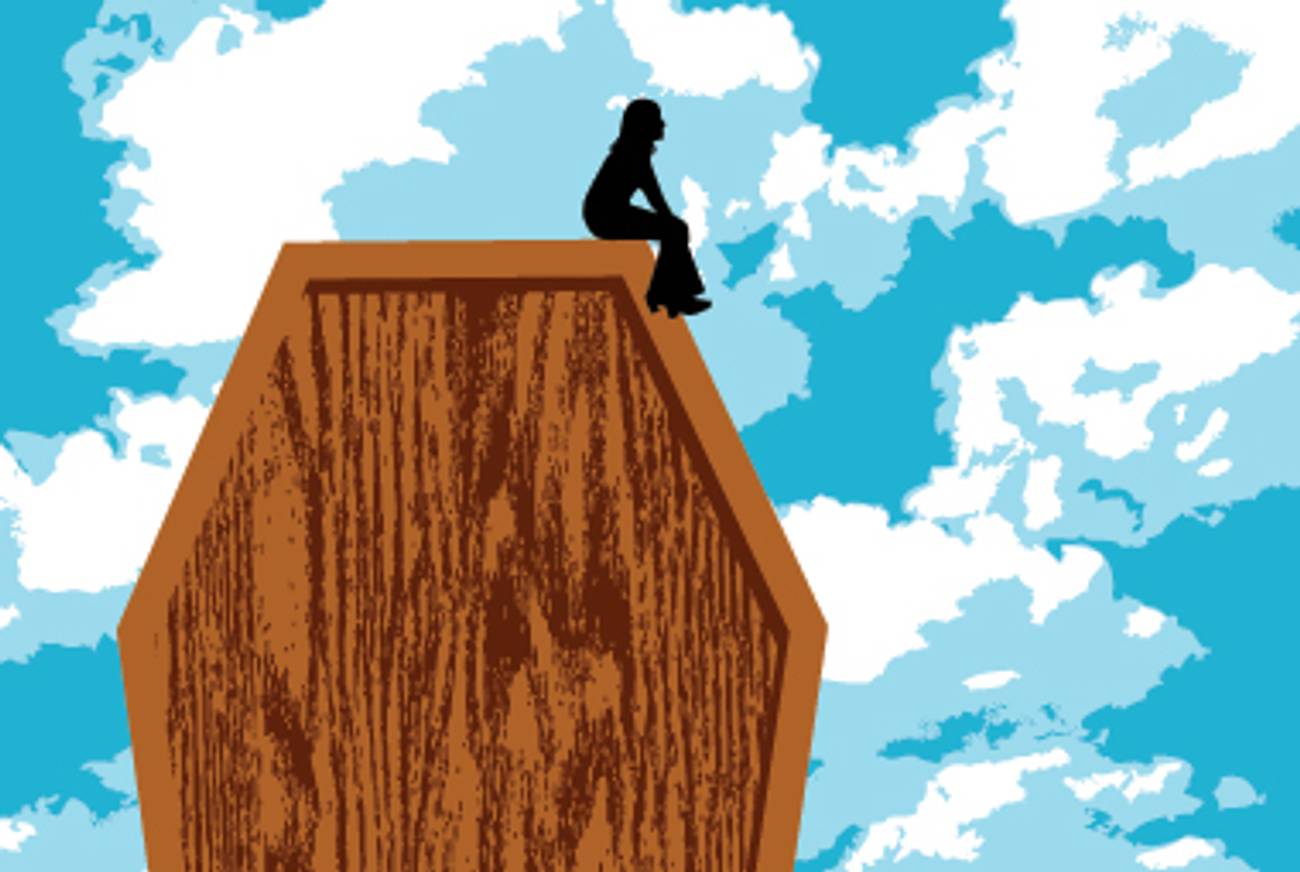Grounded
My father died on Sept. 9, 2001. The terrorist attacks two days later delayed his burial, a violation of Jewish law, but ultimately at least made me feel less alone in my grief.




Jewish law commands Jews to bury their dead as quickly as possible, ideally within 24 hours. But my father died on Sunday, Sept. 9, 2001.
My father died of cancer in Miami Beach, where I’d grown up. My fiancé, Jonathan, and I flew down from New York, where we lived, early the next day. My sister and I were aware of the imperative for a quick burial, and we scheduled the funeral for Tuesday, Sept. 11, in Florida. The burial would then take place on Wednesday, back in New York, in a plot on Long Island belonging to my father’s new wife.
I was in my childhood bed, finishing a restless night’s sleep, when the phone woke me on Tuesday morning. It was my mother. Long divorced from my father, she had decided against attending the funeral and was on her way to work in Miami, her car radio tuned to the news. “I think you should turn on the TV,” she said, a strange sound to her voice. My immediate, nonsensical assumption was that a televised tribute to my dad, a well-loved doctor in our community, was about to air.
Instead I found the unimaginable horror that was devastating New York, my adopted city. I kept the TV on as the second plane hit and the towers fell. But the funeral was approaching, so while I watched I also struggled to finish writing the eulogy I would deliver, even as I wondered whether people would still show up for a funeral on a day like this.
The attacks killed nearly 3,000 people that morning. But millions more disruptions rippled through the world that day, large and small. For those of us who experienced them, the events of our individual lives have remained caught up with this global tragedy.
For my family, the immediate practical effect of the attacks was that we would not bury my father in New York on Wednesday. I later learned that there is a Hebrew word, aninut, that describes the time between death and burial. The person mourning during aninut, the onen, is supposed to focus his or her attention exclusively on the deceased during what is typically a very brief period. Immediately upon learning of my father’s death, I had done just that, busying myself with the tasks that death necessitates: helping to plan the funeral and select a casket, notifying friends and family, and arranging for Andy Bachman, the Brooklyn rabbi who’d be marrying Jonathan and me, to preside at the burial. But when we couldn’t bury my father, I found myself in a suspended state.
I’m not particularly religious, but as happens to some nonobservant people, at the big moments in life my religious impulses have kicked in. My father didn’t have much use for religion, but he mentioned God more times during his brief illness than I can remember in all my years before. Judaism provided us, helpfully, with a script to follow in the immediate aftermath of his death—from the details of the funeral to the timing of the burial—and with each passing day I felt more keenly that our forced abandonment of that script, in addition to everything else that it was, was distinctly un-Jewish. “This isn’t how we’re supposed to do things,” I found myself thinking.
***
My father’s Miami funeral on Tuesday was well-attended, and if the assemblage appeared somewhat dazed, the service, apart from one eulogy that spoke of the morning’s astonishing developments, remained focused on the task at hand. When the rabbi who presided at the funeral met privately with family members, he mentioned, along with other instructions, that it was OK to attend celebrations in the coming months, explaining that in Jewish teaching, if a funeral procession meets a wedding procession at a crossroads, the wedding procession has the right of way. The rabbi was a stranger to me—I’d met him only once before, at my father’s wedding that spring—and he was unaware when he spoke to us that my own wedding date was four weeks away. At the time I couldn’t think of my wedding, but his words would later carry weight.
The following day, the group that was supposed to reconvene on Long Island for the burial began to unravel and disperse. With air traffic still grounded, my father’s two brothers, his best friend, and their wives rented a van and began the long journey north toward their homes in Virginia and New Jersey. A couple of days later, Jonathan boarded one of the first flights out of South Florida to get to Cape Cod for the weekend wedding of a close friend. I stayed on at my mom’s, the house in which I’d grown up, seeking comfort in familiar surroundings. I curled up with the phone talking to friends in New York. Every morning, my sister, who lives with her husband and children nearby, called the funeral home to see if there were updates on when our father’s body could be transported north.
I was feeling more and more unsettled. The hours had to be filled, so when I wasn’t anxiously reading the newspaper or watching the news, I played with my young nieces, walked on the beach, helped with dinner. But enjoying the prerogatives of the living felt increasingly, almost perversely, inappropriate. I couldn’t avoid dwelling on my father’s body, imagining it alone, unattended in a freezer. As the days ticked by, one thought continued to reassert itself: “We have to get him into the ground.”
Only recently did I look into the reasons behind the Jewish tradition of rapid burial. One interpretation, that there is mercy in bringing the soul closure in its relationship to the body, provided me a spiritual understanding for the disquiet I experienced that awful week, for the creeping feeling, as each day went by, that we were failing my father.
My sister, brother-in-law, and I finally made it to New York on Sunday, Sept. 16, a week after my father’s death and two days after what would have been his 62nd birthday. We walked through an eerily empty Miami airport, boarded an eerily empty plane, and saw the smoke rising from ground zero as we landed. On Monday, surrounded by friends and relatives, buoyed by the wise and compassionate words of Rabbi Bachman, we at last buried my father.
“I’m glad we’re all going to be together again soon for a happy occasion,” my uncle said to me then, taking for granted that Jonathan and I would proceed with our wedding. Jonathan and I had talked about it and decided not to change our plans, taking to heart the principle that a wedding procession has right of way. My uncle’s certainty helped convince me that we had made the right decision. We were married in October.
Strangely enough, getting married so soon after my father died—and having a New York wedding so soon after the attacks—seemed to satisfy a hunger for connection that so many of us had. It felt somehow hopeful. Though the wedding was a joyous, cathartic event, the sorrow and anxiety palpable in the city throughout the fall matched my own deepening despair. Looking back, I don’t think I could have managed it if the wedding had been scheduled to take place several months after my father’s death; by the winter my grief was cresting.
On Sept. 11, my sister had said to me, “Dad died and now the whole world is falling apart.” I understood. In our bubble of grief, it somehow made sense: Without our father, how could the world possibly remain as it was? As friends have inevitably lost loved ones since, I’ve wondered what it must be like for them to mourn among people unweighted by mourning. Being a New Yorker in the fall of 2001 made me feel less lonely in my grief.
Barbara Spindel is a writer and editor whose work has appeared in Time Out New York, the Daily Beast, Salon, Details, Spin, and other publications.
Barbara Spindel is a writer and editor whose work has appeared in Time Out New York, the Daily Beast, Salon, Details, Spin, and other publications.